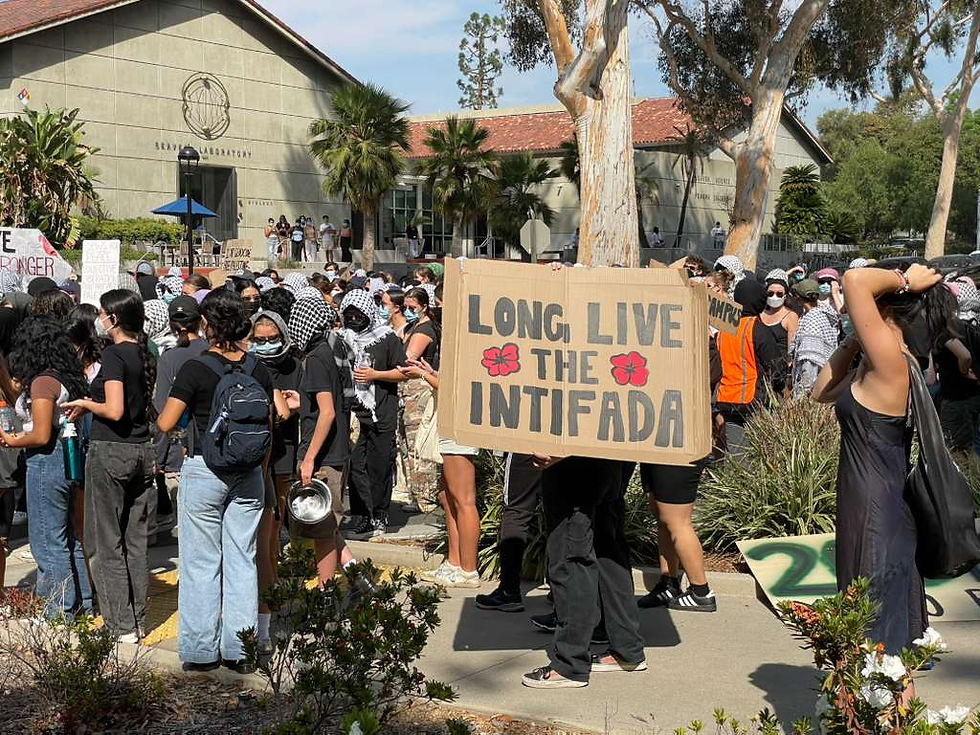Pomona Institutes Policy Changes as Activist Groups Begin Another Semester of Protests
- Emilio Bankier
- Aug 28, 2024
- 4 min read
Updated: Nov 4, 2024

Private property signage at Pomona College.
On August 21st, Pomona College Treasurer Jeff Roth, Dean of Students Avis Hinkson, and Assistant Vice-President Bob Robinson sent a “Reminder of Campus Policies and Updates on Safety Enhancements” email to Pomona students. The email contained important changes to campus operations while reiterating demonstration policies already in place during the previous academic year.
Starting this fall, most Pomona buildings, including academic halls, will only be accessible via ID card or key. Previously, most buildings were open to all on weekdays. The “Campus Changes FAQ” site does not specify any change to residence hall access.
Alexander Hall will remain accessible by appointment-only and guarded by campus safety officers, a policy in place since the April 5th sit-in that ended in 20 student arrests. 5 additional Campus Safety officers have been hired specifically for Pomona, a move which the administrators wrote would strengthen “the overall security presence on campus.” The email emphasized that the officers are trained in “de-escalation, mental health crisis intervention and cultural competency.”
The email continued by highlighting the College’s demonstration policies, which now explicitly forbid encampments. “[Encampments] take over space that rightfully belongs to the entire community and can pose a potential danger to those within them, whether from their construction or from other unlawful activity or by creating a target for counter-protesters.” The email noted that if an encampment forms, the college will offer two warnings to disperse and a notice of consequences. If protestors do not comply, “further action will be taken, which may include internal disciplinary process and citation, and ultimately detention and arrest by law enforcement.” Pomona was home to two encampments in the spring semester, neither of which were forcibly removed by the college, and no participants were arrested.
The administrators, who have been central targets in the pro-divestment campaign, also repeated warnings that individuals on campus must readily identify themselves to College officials, Campus Safety, or law enforcement when asked, and that those refusing to do so may be subject to disciplinary sanctions and arrest by law enforcement.
The email did not announce a complete ban of identity concealment, which protesters have claimed protects them from identification and doxxing. College officials have criticized the use of masks and scarves as intimidating and a hindrance to dialogue as well as a security risk. Other colleges have taken steps to ban identity concealment entirely. On August 19th, the president of the University of California system informed UC Chancellors that “masking to conceal identity” would be forbidden in the new academic year.
The email ended by clarifying that because Claremont Colleges’ Campus Safety staff are not sworn law enforcement officers and cannot make arrests, the colleges “necessarily rely on local law enforcement.”
While many policies in the email had been in place last year, they had not been so clearly outlined and were almost never enforced. When policy was enforced and students faced disciplinary and legal consequences, Pomona faced swift backlash from students and faculty. Most notably, a faculty resolution after the April 5th sit-in and arrests condemned the “present and future militarization and use of police on the campus.”
The extent to which students' violations of college policies are punished, however, ultimately depends on Pomona’s Judicial Board, commonly known as JBoard. Run entirely by students, JBoard is guided by a restorative justice approach.
In an Instagram post, Pomona Divest from Apartheid (PDfA) denounced what it called “new bullshit policies,” and promised escalation.
Even before the academic year formally began, students had already begun organizing in support of divestment and PDfA’s demands. At dinners hosted by Dean Hinskon on August 15th and 19th, Pomona students working as RAs, Sponsors, and Orientation Adventure leaders made speeches endorsing PDfA’s demands and urging Pomona to drop trespassing charges against the 19 students arrested on April 5th. During Pomona’s first-year move-in, some students turned their backs when Pomona President Gabi Starr gave a welcoming speech.
On August 23rd, PDfA and Claremont Students for Justice in Palestine hosted a “People’s Orientation” on Marston Quad, aimed at informing new students about the anti-Zionist divestment campaign. The slideshow shown at the event features an image of a gun-wielding Hamas militant next to a poem commemorating Palestinian “martyrs.” The presentation goes on to attack Zionism, as well as Pomona’s administrators and Board of Trustees.
On the first day of classes, the newly formed “7C Staff for Palestine” hosted a vigil outside of the Honnold-Mudd Library. After the email announcing Pomona’s policy changes was sent out, the group uploaded a post clarifying that masks would be required as a precaution against COVID-19.
On August 27th, Pomona’s annual convocation ceremony was forced to go virtual after protesters blocked the entrance to Bridges Hall of Music. PDfA and SJP had announced the protest days earlier with a call to boycott. In anticipation of potential disruptions, Pomona announced that attendees would need to present a school ID and that masking would not be allowed unless “medically necessary,” a move PDfA attacked as an “ableist and fascist mask-ban.”
As faculty and students arrived, they were met by masked protestors marching in a circle while chanting various slogans. Masked individuals sat in front of the building doors, though faculty entered the building through a separate entrance. At 11:05 am, an email update informed students that the event would be livestreamed, and speakers delivered their remarks to an empty auditorium.
.png)



Thanks for Your article...it gives us immense knowledge. This is a titanic mixing article. I am all around that genuinely matters content with your
call girls in Dehradun
call girl Noida
call girl Indore
This Aerocity Call Girl offers a luxurious and indulgent experience. Every aspect of it, from the elegant appearance to the engaging conversation, exceeded my expectations.